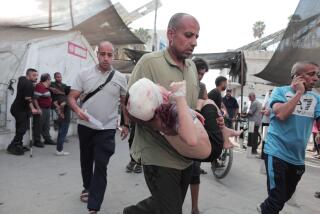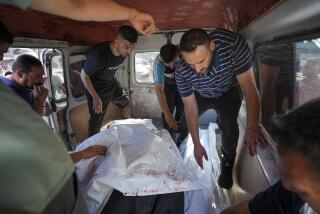Suicide bombing kills 43 in Algeria
- Share via
CAIRO — A suicide car bombing at a police academy killed at least 43 people Tuesday in Algeria, where the government has been battling a resurgent Islamic militant group that has attacked international organizations and security-related targets.
The bomb exploded about 7 a.m. near the entrance to a paramilitary police training school in the Les Issers district, about 40 miles east of the capital, Algiers. Witnesses quoted by Algerian media said that most of the victims, including at least 38 wounded, were parents and recruits waiting to register for the academy’s entrance exams.
The Interior Ministry said the casualty figures were preliminary estimates.
No group immediately claimed responsibility. The attack followed a bombing Aug. 9 that killed eight people, mostly national police officers, near a navy compound and beach resort. That followed a double bombing in December that targeted a United Nations building in Algiers and killed about 40 people.
An Algerian journalist, who asked not to be named, said by telephone that the explosives had been placed in a van. He said that state television was restricting news coverage of the carnage and that roads to the site had been blocked.
“Algerian media are showing very little of this,” the journalist said. “The government will try to shut down coverage on this. This is very sensitive for them. It’s a bad time here. There’s inflation. The jobless rate is high. Young Algerians are taking boats to Europe. People are fed up and scared.”
One father quoted by Al Jazeera television said: “It’s utter carnage. It’s a catastrophe. May God punish them for the crime they have committed against these youngsters, and their country.”
A group calling itself Al Qaeda in the Islamic Maghreb has grown stronger and become more active over the last 18 months. The organization is the re-creation of the former Salafist Group for Call and Combat, which was formed by militants who fought in Algeria’s civil war in the 1990s.
“There is no other Islamic group in Algeria that could carry out such an operation,” said Diaa Rashwan, a terrorism expert with the Al Ahram Center for Political and Religious Studies in Cairo. He said the group appears to be concentrating on military and police targets, possibly to avenge government raids and arrests in recent months.
“The group wants to show how strong it is,” Rashwan said. “Anybody can hit soft [civilian] targets; such attacks do not reflect any talent or strength. But when you hit high government offices and military targets, this shows the group’s might.”
Government crackdowns and amnesty programs appeared to have weakened Islamic radicals. But beginning in 2007, a string of attacks across the country indicated that Al Qaeda in the Islamic Maghreb was growing bolder and more stealthy. In September, a bomb exploded during a rally for President Abdelaziz Bouteflika, killing more than 20 people. The president was not harmed. Days later, at least 30 people died in a bombing near a coast guard barracks in the town of Dellys.
The rise of Islamic militancy accelerated in 1992, when the Algerian army canceled legislative elections that were likely to favor the Islamic Salvation Front. The ensuing civil war, which ended in 2002, killed an estimated 200,000 people.
Tuesday’s attack underscores both the danger posed by Al Qaeda in the Maghreb and the limits of its reach. The network has shown the ability to inflict damage in Algeria that worries anti-terrorism officials in North Africa and Europe, where it has financing and logistical cells entrenched in large North African immigrant neighborhoods. French authorities see the network as a major threat to their nation.
Despite repeated threats against Western and North African governments and its self-description as a regionwide offshoot of Al Qaeda, the network has had little success in carrying out large-scale attacks beyond its home base. Its main strikes outside Algeria have been the killings of a family of French tourists in Mauritania and the kidnapping of an Austrian couple in Tunisia.
As a result, Western and North African anti-terrorism officials question whether Al Qaeda in the Islamic Maghreb is really much more than an Algerian group that has attracted recruits from neighboring nations.
--
Times staff writer Sebastian Rotella in Madrid and Noha el-Hennawy in The Times’ Cairo Bureau contributed to this report.
More to Read
Sign up for Essential California
The most important California stories and recommendations in your inbox every morning.
You may occasionally receive promotional content from the Los Angeles Times.














